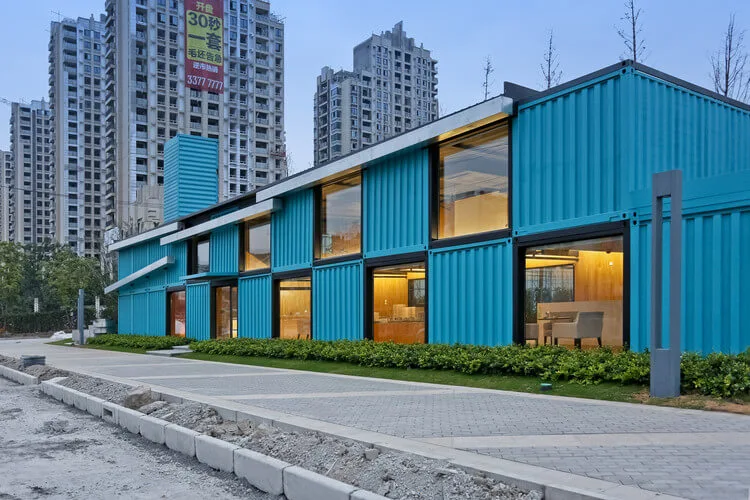Transforming Workspaces: The Rise of Shipping Container Offices in the Modern Business Landscape
Amidst the growing tide of innovative workspace solutions, repurposing shipping containers into sophisticated office environments has surfaced as a notable trend.
Sturdy, abundant, and designed for durability, shipping containers have graduated from their maritime roles to take center stage in the architectural evolution of workspaces. Their inherent modularity allows for both temporary and permanent structures, providing a highly customizable option that contradicts the rigidity of conventional office buildings. This article delves into the intricacies of shipping container offices and their role in transforming the landscape of business environments.
Table of Contents:
- The Appeal of Shipping Container Offices
- Shipping Container Offices and Remote Work Trends
- Legal and Zoning Considerations for Container Offices
- Case Studies: Successful Shipping Container Office Implementations
- Future Projections: The Potential Growth of Container Office Spaces
- Comparing Traditional Office Spaces and Container Offices
- Getting Started with a Shipping Container Office
- Design Innovations in Shipping Container Workspaces
- Environmental Benefits of Repurposing Shipping Containers
Key Takeaways:
- Understanding the appeal of innovative and cost-effective shipping container offices
- Appreciating the environmental benefits associated with the repurposing of shipping containers
- Exploring design innovations and the trend toward customization in container workspaces
- Recognizing the adaptability of container offices to remote and hybrid work trends
- Comparing container offices to their traditional counterparts and guiding getting started
The Appeal of Shipping Container Offices
As financial prudence rises to the forefront of business strategy and the chase for sustainability grows more fervent, shipping container offices are a paragon of this modern ethos. The resourcefulness exhibited through recycling these structures into functional workspaces signifies a departure from traditional, often wasteful, construction practices. Their rugged exterior belies the potential for a warm, inviting interior that rivals the comfort of conventional office environments. What draws the modern professional to this alternative solution is not just the charm of innovation but the tangible benefits:
- A dramatic reduction in building time and expenses
- Ease of relocation
- A significantly smaller carbon footprint
With businesses seeking avenues to be more environmentally conscious while maintaining cost efficiency, the shipping container office has emerged as an embodiment of pragmatism blended with modern design. The brilliance lies in their simplicity and adaptability, making them an attractive choice for startups and established companies across various industries.
Shipping Container Offices and Remote Work Trends
The paradigm shift towards remote work has illuminated the need for personal and professional spaces that cater to new working habits. As these trends evolve, shipping container offices are lauded for their adaptability, carving out a niche as private workspaces that reconcile the comfort of home with the productivity of an office setting. Their ability to operate autonomously or within a collective of other container offices makes them ideal for various remote work scenarios. This model provides an economical solution for businesses while offering employees a sense of place and purpose, often needing more in-home environments. The synergy between shipping container offices and the burgeoning remote work culture heralds a reimagined future of work defined by flexibility and personalization.
Legal and Zoning Considerations for Container Offices
Embracing the practical wonder of shipping container offices requires a firm grasp of the regulatory landscape. With each jurisdiction presenting its own challenges, businesses must conduct due diligence regarding local ordinances and building codes. The tenets of safety, accessibility, and zoning compliance form the bedrock on which shipping container office projects must be built. Engaging with knowledgeable authorities and legal advisers can streamline the process, fostering a clear pathway to achieving an up-to-code office space that meets regulatory standards and embodies an organization’s pioneering spirit.
Case Studies: Successful Shipping Container Office Implementations
Illustrative case studies of shipping container offices in action shed light on the feasibility and success of such ventures. Spanning from boutique creative studios to temporary construction site offices, these narratives articulate the diverse applicability and ingenuity of modified containers. These transformations often speak of minimized disruption to existing landscapes, swift on-site assembly, and the unparalleled vitality of those who inhabit them. By embracing these resourceful structures, large and small organizations have chiseled a unique identity and catalyzed a conversation around innovation in workspace creation.
Future Projections: The Potential Growth of Container Office Spaces
With urban landscapes continually redefining themselves, the role of shipping container offices is set to expand. Current market analyses predict the growing acceptance of these modules as permanent fixtures in the corporate environment. The trajectory is clear: container offices are forecasted to increase with the intensification of eco-consciousness and embracing adaptive design. However, alongside this promising forecast, businesses must remain aware of the evolving challenges. Adjusting to shifts in work culture, supply chain consistency, and public perception will be imperative to harness the full potential of this innovative office solution.
Comparing Traditional Office Spaces and Container Offices
Many factors intersect when comparing conventional office space to the unconventional realm of container offices. Traditional office buildings often entail lengthy leases, significant overhead, and structural limitations, deterring those who seek nimbleness in their operational habitat. Conversely, container offices offer economic agility and customization that traditional spaces cannot readily match. Decision-making in this context should hinge on an organization’s growth strategy, the well-being of its workforce, and the value placed on environmental stewardship.
Getting Started with a Shipping Container Office
A journey to a shipping container office begins with envisioning the potential and identifying the right partners to bring it to fruition. Initial consideration of size, location, and concept lays the foundation of this enterprise. Collaborating with architects and construction experts specializing in this niche can elevate a standard container to a beacon of modern workspace. Ensuring the vision aligns with practical requirements calls for a harmonious blend of creativity, functionality, and compliance. The result can be a workplace that inspires and reflects a company’s commitment to innovation and sustainability.
Design Innovations in Shipping Container Workspaces
The ingenuity behind shipping container workspaces stretches beyond their basic functionality; they serve as a canvas for cutting-edge architectural ventures. These repurposed structures praise efficiency, fostering an environment of a brisk construction timeline and fewer wasted materials. Yet, they are haute couture in the world of office design, capable of reflecting a company’s brand through their exterior façade and custom interiors. Businesses looking to stand out find a faithful ally in shipping container offices. The seamless fusion of industrial chic with modern amenities and technology creates an ambiance conducive to productivity and creativity. For a closer look into these innovations, architectural enthusiasts and professionals may turn to resources such as Architect Magazine, showcasing how these modular edifices are continually pushing the boundaries of design.
Environmental Benefits of Repurposing Shipping Containers
Bearing the mantle of environmental responsibility, businesses are paving the way toward greener practices by adopting shipping container offices. This manifestation of upcycling greatly attenuates demand for new construction materials, which, in turn, shrinks the waste and energy typically associated with building. Add to that the durability of shipping containers, and you get a lifespan far exceeding that of standard temporary structures. As companies worldwide amplify their ecological efforts, shipping container offices have become a leading example of innovation in sustainable development. Diving deeper into environmental considerations, one finds a trove of insights at Environmental Leader, echoing the significance of eco-conscious alternatives and their impact on conservation and corporate responsibility.

Hello! Let me enthusiastically introduce myself as a dedicated blogger fueled by an intense passion for meticulously crafting insightful and well-researched blogs. My mission revolves around providing you, dear readers, with a veritable treasure trove of invaluable information.







